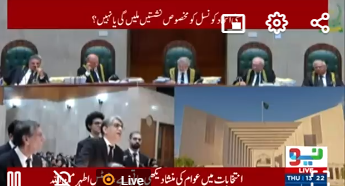Islamabad (Web Desk): The Supreme Court (SC) on Thursday adjourned the hearing of Sunni Ittehad Council’s (SIC) plea against denial of reserved seats for women and minorities in the national and provincial assemblies till Monday (July1).
A full court 13-member bench, headed by Chief Justice of Pakistan (CJP) Qazi Faez Isa and comprising Justice Syed Mansoor Ali Shah, Justice Muneeb Akhtar, Justice Yahya Afridi, Justice Amin-ud-Din Khan, Justice Jamal Khan Mandokhail, Justice Muhammad Ali Mazhar, Justice Ayesha A Malik, Justice Athar Minallah, Justice Syed Hassan Azhar Rizvi, Justice Shahid Waheed, Justice Irfan Saadat Khan and Justice Naeem Akhtar Afghan, is hearing the petition.
The proceedings were broadcast live on the SC’s website and its YouTube channel.
Today's hearing came a day after Attorney General for Pakistan (AGP) Mansoor Usman Awan on Wednesday submitted written arguments to the Supreme Court (SC) in the case of Sunni Ittehad Council (SIC) regarding reserved seats.
The AGP requested the top court to dismiss the SIC’s appeal and uphold the verdict of Peshawar High Court (PHC) in the matter.
“A political party that participates in elections and wins at least one seat can get reserved seats. According to the law, a list has to be provided for certain seats to the ECP (Election Commission of Pakistan),” he said.
The SIC neither participated in the elections nor submitted the list for the specific seats, “which are only reserved for minorities and women,” he added.
“Independent candidates can join the political parties that have representation in the Parliament,” the AGP said.
He argued that the SIC was not a parliamentary party at the time of the allocation of reserved seats, and its demand for reserved seats was unconstitutional.
The AGP said that the Pakistan Peoples Party (PPP), Pakistan Muslim League-Nawaz (PML-N) and others had submitted their lists before the elections, and their voters were aware about the reserved seats before elections.
Meanwhile, Pakistan Tehreek-e-Insaf (PTI) has filed a petition in the SC seeking to become a party in the case.
In its petition the former ruling party maintained that the ECP levelled "unfounded" allegations on the PTI during the hearing of the SIC's appeals".
The petition read that the PTI and the SIC were deprived of reserved seats despite being eligible. The SIC was ready to provide a list of candidates for the allocations but was denied permission to submit it.
The PTI blamed the commission for "unconstitutionally" allocating reserved seats belonging to the PTI-SIC alliance to other political parties which also went against the aspirations of the nationals.
It is pertinent to mention that following the February 8 elections, where PTI-backed independent candidates joined SIC after the PTI lost its electoral symbol 'bat' due to a ruling by the apex court.
The ECP withdrew PTI’s electoral symbol, a move ratified by the Supreme Court.
The ECP, in a 4-1 verdict ruled in March that SIC could not claim reserved seats due to significant legal flaws and failure to submit a mandatory party list for such seats.
Later, the ECP redistributed these seats among other parliamentary parties, benefiting primarily Pakistan Muslim League-Nawaz (PML-N) and Pakistan Peoples Party (PPP) with 16 and five additional seats respectively, while Jamiat Ulema-e-Islam-Fazl (JUI-F) received four seats. PTI rejected this verdict as unconstitutional.
In the same month, the Peshawar High Court (PHC) dismissed an SIC plea challenging the ECP's decision to deny them reserved seats.
On May 6, a three-member Supreme Court bench, led by Justice Mansoor Ali Shah and including Justice Muhammad Ali Mazhar and Justice Athar Minallah, suspended the PHC decision. The case was then referred to a larger bench due to its constitutional implications.
In late May, a full court had been constituted to hear the case, comprising all judges except Justice Musarrat Hilali.
As the case was taken up on June 3, Justice Mandokhail had noted that the public did not vote for independent candidates but those nominated by the PTI in the February 8 general elections.
Meanwhile, Justice Shah suggested that the controversy could be ended if the ECP gave the formerly independent candidate another three days to decide afresh whether to join another political party.
On June 22, the ECP justified its decision to deny reserved seats to SIC for women and non-Muslims through a statement submitted by Senior Counsel Sikandar Bashir Mohmand to the Supreme Court.
The electoral body argued that SIC did not qualify for reserved seats as it did not meet the constitutional criteria of being a political party under Articles 51(6)(d), 56(6)(e), and 106(3)(c) of the Constitution.
Additionally, SIC failed to submit a timely priority list (Form 66) for reserved seats as required by the election program.
The ECP also pointed out that Article 3 of SIC's constitution restricted party membership to adult Muslims only, which contradicted constitutional provisions on freedom of association, freedom to profess religion, and equality of citizens (Articles 17, 20, and 25).


